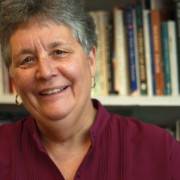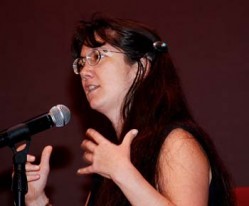Religion is the New Political Science
 By Mary E. Hunt
By Mary E. Hunt
Originally posted for Feminist Studies in Religion
If I were a member of Congress (now there’s an idea for a second career) I would hire a religion major on my staff. Actually, I would hire someone trained in feminist studies in religion because I think such people have a strong handle on what is happening around the globe.
Consider recent world events, admittedly refracted through an inside-the-Beltway lens. Who better than a student of religion to sort out the difference between Shias and Sunnis to make sense of Iraq? What econ major could understand the depths of the Hobby Lobby case in all of its evangelical complexity, much less see how the Conestoga part reflects certain Mennonite views? Gaza is a conundrum with deep religious roots that are so tangled not even the most sophisticated scholars can pull them apart. The struggle between Russia and the Ukraine has some religious dimensions as well. And what about President Obama’s Executive Order that protects gender identity as well as sexual orientation when it comes to federal contractors? With the predictable religious exemptions crowd breathing heavily, it takes someone with knowledge of what constitutes a religious organization and what does not to see how important this action is.
Feminist students of religion have well-honed critical skills, healthy suspicion of the status quo, and the technological tools to make a difference. Despite the hype that would have parents who worry about the practicality of religion as a choice of majors dissuading their children and pointing them toward law school (my father did!), I believe our intellectual backgrounds prove eminently practical.
Two immediate experiences inform my sense that hiring religion majors makes good sense. One is the nature of Hill staffers. They are invariably bright, personable, and often well connected before they arrive. Many of them are straight from college or graduate school. Once hired, they answer phones, respond to constituents’ inquiries, lead folks from back home on tours of the Capitol, and help their members to think about the many issues that face the Congress. Most people would be amazed if they saw up close how much congressional staffers do to shape our national direction. While many are political science majors, history, pre-law, even law school trained, I wonder if many of them have the background to grapple with the complexities of some of today’s issues.
Contrast that with the broadly based education of students of religion. Four intelligent, well-trained feminists in religion have been interning at WATER (Women’s Alliance for Theology, Ethics and Ritual) for the summer. They bring inquisitive minds, excellent computer skills, thoughtful, critical approaches to research, and a willingness to jump in with both feet as part of a feminist team. Jump they have into small conversations with some of the leading scholars in religion, into meetings with staffers of our colleague groups including Catholics for Choice, the Women’s Ordination Conference, the Religious Coalition for Reproductive Choice, the religion office of the Human Rights Campaign, NETWORK, and Get Equal.
They have seen a little bit of how Washington works, and the unique role of the non-profit sector in shaping public opinion. People who work for non-profits need such background. Whether the issue is ecology, employment, immigration, reproductive justice, or the like, an employer can be sure that most religion majors are not coming cold to the subject. And given how feminist analyses of these matters shape the discourse, they are ahead of the curve when it comes to a thorough consideration of many competing views.
Our scope has to be broad in religion if we are to be meaningful partners in formative conversations. We touch on literature and poplar culture, history and philosophy, scripture and religious practice, psychology and the other social sciences, not to mention the arts. Feminist work in all of those fields and more has reshaped the landscape to such a degree that I would venture to say that without someone on board who brings this data to the table it is hard to imagine how a Member of Congress or other decision-maker could function. I am not suggesting that an influx of religion majors would end the current gridlock in Congress. But I do think that moving out of the box that can be political science—with all the attendant horse-trading and bottom line driven compromises that go with it—could be a fresh start.
Thus, my invitation is twofold. I invite my colleagues all over town (read: Washington, D.C.) to recruit interns and new staff members from among the feminists trained in religion. They bring a unique set of experiences, skills, and values. I invite today’s feminist students of religion to think well beyond the narrow choices of academia and ministry. Consider a job in the public sector, or in the non-profit world where your background is needed and will be appreciated.


